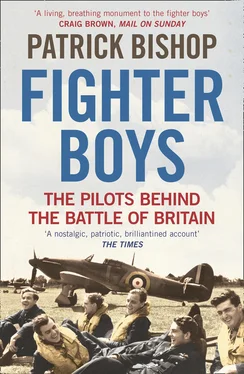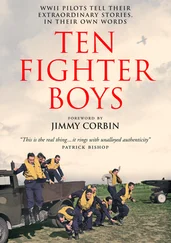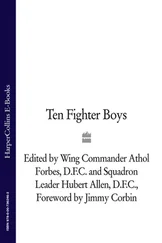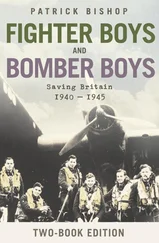The modern assumption is that such experiences must leave a mark. Feeling sorry for oneself lay outside the range of emotions allowed to adolescents in Britain in the 1930s. Kingcome admired and respected his largely absent father. Paddy Barthropp’s mother died in childbirth, a tragedy that meant his father ‘resented my very existence almost up to the time of his own death in 1953. I never blamed him.’ At Ampleforth one day in 1936 ‘a school bully approached me to say that it would be a good idea if I read page four of The Times in the school library. There it was for all to see – “In the High Court of Bankruptcy, Elton Peter Maxwell D’Arley Barthropp”…the fact that one was skint was not acceptable and carried a long-lasting social stigma…the next few days were the most embarrassing of my life.’ He was farmed out to a step-grandfather, ‘extremely rich and very nasty’, among whose many possessions was the Gresford Colliery near Wrexham. On hearing that there had been a disaster at the mine killing 264 miners, the old man ‘replied that he didn’t want to be disturbed. He disgusted me.’ 38Barthropp eventually got an apprenticeship with Rover Cars in Coventry before deciding to join the RAF after a visit to the Hendon Air Display.
Barthropp was hopeless academically. He failed the school certificate five times, and only scraped through his RAF board by gaining ‘a phoney pass’ from a crammer. Roland Beamont also failed his school certificate and had to resort to coaching to get the qualification he needed to be eligible for a short-service commission. Denys Gillam, who joined the RAF on a short-service commission in 1935, had been kicked out of his prep school, then his public school, Wrekin College, for drinking and exam irregularities. He later joined 616 Squadron and commanded two fighter squadrons. Against the wisdom of the pre-war days his preferred pilots were ‘non-athletic men between the ages of eighteen to twenty-three’, who had ‘better resilience to stress than the successful rugger player or his equivalent…all the best pilots that I knew tended to be rather weedy, though there were exceptions. The best pilot were ones that hadn’t had much success in other spheres and were determined to succeed.’ Teaching a course to a class of wing commanders later in his career, he discovered that ‘out of a group of twelve…four had been thrown out of their school before they left. This was, I think, fairly typical.’ 39Kingcome was to deliver the opinion later that, ‘Fortunately for us, and, I believe, for the RAF in that generation, there were [no]…psychological and aptitude tests, which would have failed a majority of candidates for short-service and permanent commissions and I suspect might have cost us the Battle of Britain.’ 40
Expansion increased the flow of men from the lower reaches of the RAF into the ranks of the fliers as candidates were selected from among the ground crews to serve as sergeant pilots. Of the 2,500 pilots originally sought to man the new aircraft and squadrons, 800 were found from among those already serving as aircraftmen or non-commissioned officers. The RAF apprentice schemes allowed a trickle of fitters, riggers and other tradesmen to receive flying training, on the understanding that they would return to their trades after five years. There were also two places set aside for the top performers at Halton to go on to Cranwell to take up a cadetship. Many, perhaps most, apprentices had dreams of flying. Realizing them was difficult. There was an obvious necessity to maintain the supply of highly skilled, expensively trained ground staff to keep the service flying and prevent apprenticeships from turning into a back-door route to a career as a pilot. None the less, in the pre-expansion years, some of the keenest and most talented felt themselves baulked by what was supposed to be a system that worked on merit. George Unwin was brought up in South Yorkshire, where his father was a miner. His mother encouraged his education and he won a scholarship to Wath Grammar School, and aged sixteen passed his Northern Universities matriculation exam. There was no money for him to take up a place. The only work on offer was down the pit. When, a month before he was due to leave, his headmaster showed him an RAF recruiting pamphlet, he decided to join up.
Unwin chose the Ruislip administrative apprentice school rather than the technical school at Halton, as the course there was two rather than three years. It was a spartan life. The food was horrible. They seemed to live on gristly mutton rissoles, and food parcels from the outside world were eagerly received. They shaved in cold water and lived twenty to a billet. Unwin initially had no thoughts of flying, but the sights and sounds of the aerodrome kindled his ambition. After passing out in 1931 as a leading aircraftman, the minimum rank to qualify for pilot training, he applied, but discovered that ‘only one per cent per six months was taken’.
He repeated the process twice a year without success. ‘I was getting a bit fed up at not being accepted. I had everything else. I was playing for the RAF at soccer, and that was one of the things you had to be, to be very good at sport. I couldn’t understand why I wasn’t being selected. You went through a very, very tedious process. First of all you saw your flight commander, then your CO, and then your station commander. If you got past him you saw the air officer commanding. I’d reached the point when I was going to see the AOC and I was getting desperate. At the time it was Air Vice-Marshal J. E. A. Baldwin, who loved polo and kept his own polo ponies.’ Unwin decided that when the inevitable question about hobbies came up at the interview, he would be prepared. ‘I said “horse riding”. He pricked up his ears and said, “Really?” I said, “Of course, I can’t afford it down here, but the local farmer at home has a pony and lets me ride it.” The only time I’d ridden a pony or anything on four legs was in the General Strike when the pit ponies were brought up and put in fields. I was thirteen and we used to catch them and jump on their bare backs and go haring down the field until we fell off.’ 41
It worked. He was on the next course. It was 1935, four years after he first applied. In August 1936 he was posted to 19 Squadron at Duxford as a sergeant pilot, where his flight commander was Flight Lieutenant Harry Broadhurst, an ex-army officer who had joined the RAF in 1926 and flew in the campaigns against unruly tribesmen on India’s North-West Frontier. Broadhurst had played a large part in building the squadron’s reputation for flying excellence, which had won it many trophies, and he was regarded as the best shot in the RAF.
Unwin, despite his background, fitted relatively easily into the squadron. His best friend was another ex-apprentice whom he had met on the flying course, Harry Steere, who had gone to Halton from his secondary school in Wallasey in 1930. The two were to fly together for six out of the next seven years. Unwin found that 19 Squadron’s competitive streak was compatible with a relaxed approach to duty. ‘You didn’t fly Saturdays, ever. You could take an aeroplane away for a weekend any time you liked. You used to fly away for lunch. You were encouraged to do this because it helped your map-reading. There were no aids at all, so you [navigated] visually. Radio telephony wouldn’t work more than three miles from the aerodrome and then the background noise was so terrific you couldn’t hear anything anyone was saying.’ On annual exercises at Catterick, Unwin would take his aircraft and buzz his home village of Bolton Upon Dearne.
Making the transition from ground to air was a hit-and-miss affair and required the patronage of an interested senior officer. Ronald Brown left Halton in 1932 to be posted to the RAF station attached to Cranwell, where he worked as a fitter overhauling the engines of the aircraft on which the cadets at the college were taught to fly. Every morning ‘the instructors would have a ten-minute flight to check the aircraft was safe for the cadets, and as they were dual-control aircraft we were able to jump in the back or the front. Inevitably that meant we were allowed to fly the plane with them, and long before I went on a pilot’s course I was looping and rolling aeroplanes to my heart’s delight every morning.’
Читать дальше












